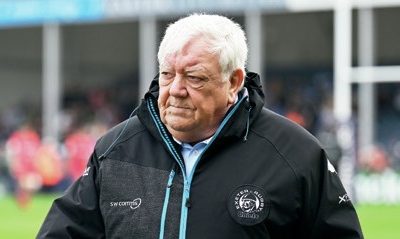
 Here are the cold hard facts. There is only one “pool of death” in the 2019 World Cup draw made in Kyoto last week, and England are in it. Which means that for a second tournament running England are at risk of going out in the pool stage.
Here are the cold hard facts. There is only one “pool of death” in the 2019 World Cup draw made in Kyoto last week, and England are in it. Which means that for a second tournament running England are at risk of going out in the pool stage.
The idea that lightning cannot strike twice after the 2015 debacle is wishful thinking.
Even so, some commentators have taken the line that even though England have got a tough draw alongside two other top tier nations, France and Argentina, they still have the time to make sure of their presence in the knock-out stage through assiduous preparation and planning.
While that’s a good start, it’s also a given. We know already that Eddie Jones is unlikely to leave any stones unturned in that regard, especially given his inside knowledge of Japan.
However, I’m sure that Stuart Lancaster also thought he had all the bases covered until the ground under his feet caved in and England crashed to oblivion in the 2015 tournament, after being beaten at Twickenham by Wales, and trounced by Australia.
Remember the top secret ‘state-of-the-art’ training facility at Pennyhill Park that Lancaster wanted to keep from prying eyes – but was then gleefully occupied by South Africa and others after the host nation’s exit?
Or how about the mile-high altitude training in Colorado that was meant to deliver the fittest England team of all time, raring to go as the tournament started? Instead, Chris Robshaw’s crew went into their warm-up games devoid of energy and drive – with a dismal display against France in Paris plumbing the depths.
That England barely improved when the 2015 World Cup began in earnest told us that the strength-and-conditioning strategy had backfired spectacularly.
When it comes to World Cups it is evident that some coaches are much better at getting their teams to peak than others, and it is comforting that Jones’ record with Japan in 2015, South Africa in 2007, and Australia in 2003 suggests he is handy in this regard. Furthermore, the idea that Jones is an outstanding coach is backed up all the way by his track-record
However, there is also a large portion of luck involved, especially where injuries and disciplinary bans to world-class players are concerned, and the calibre of their replacements.
It is this wildcard element that can play havoc, especially in World Cups, and the idea that Jones is infallible and will automatically steer England past France and Argentina into the quarter-finals is fantasy.
 Two months ago England lost a landmark new world record of wins and a Six Nations Grand Slam on the same afternoon in Dublin against an Ireland side that had been beaten by Wales and Scotland. They lost it while barely firing a shot, and a few weeks later Jones admitted that he was “filthy” with himself for getting selection wrong.
Two months ago England lost a landmark new world record of wins and a Six Nations Grand Slam on the same afternoon in Dublin against an Ireland side that had been beaten by Wales and Scotland. They lost it while barely firing a shot, and a few weeks later Jones admitted that he was “filthy” with himself for getting selection wrong.
That is not the stuff of certainty, and we will have to wait until the autumn to see how England regroup after the bold experiment in Argentina and the Lions tour to New Zealand.
What we do not have to wait for is the knowledge that the World Cup is still nowhere near as competitive as it should be despite eight tournaments having been held since its inception 30 years ago.
World Rugby – or the IRB in their former guise – have had a plan to increase the number of truly competitive nations for as long as I can remember.
Yet, in Japan 2019 the quarter-final candidates are as predictable as ever. England may have drawn the short straw again in Pool C, with France and Argentina competing with them for two places in the last eight, but outside that pool it’s business as usual, with Scotland and Ireland favourites in Pool A, New Zealand and South Africa in Pool B and Australia and Wales in Pool D.
The only possible upset would be if hosts Japan beat the Scots or Irish in the same way they did South Africa in 2015.
Instead of one ‘pool of death’ in Japan there should be four of them.
It is a travesty that despite one plan after another over the last 30 years to develop so-called tier 2 nations such as Japan, USA, Canada, Romania, Georgia, Spain, Russia, Fiji, Samoa and Tonga, into being competitive with the ‘Big Eight’ in the Six Nations (Italy excluded) and the Rugby Championship (Argentina excluded), rugby union is no further down the road.
World Rugby would no doubt like to hail Argentina as their success story, but it is hardly a conclusive case history because the Pumas have been competitive against the best nations since the amateur era.
Just ask Bill Beaumont who toured there in 1981 with an England team that edged a fiercely contested series.
That was compelling precisely because of that. However, a World Cup in which tier 2 nations are merely gallant whipping boys, as they are likely to be again in Pools A, B and D in 2019, is no longer acceptable in rugby union’s showcase tournament. We need more pools of death. Urgently.


United Rugby Championship
Vaea Fifita’s commanding presence has Scarlets pushing for URC play-off spot

British and Irish Lions
British and Irish Lions Watch: Caelan Doris confirmed to miss the tour with injury

























You must be logged in to post a comment Login